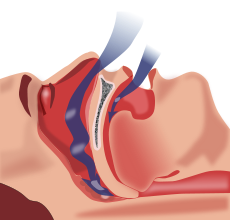Sleep Apnea
Sleep apnea
Sleep apnea is a disorder in which there are frequent pauses in breathing during sleep. Typically, normal breathing starts after the pause, sometimes with a loud snort or choking sound. Sleep apnea is treatable.
Breathing pauses can last from a few seconds to minutes. They often occur 5 to 30 times or more an hour. When breathing pauses or becomes shallow sleep pattern is disturbed and deep sleep changes into light sleep . This results in poor sleep quality that results in tiredness during the day or excessive daytime sleepiness.
Most people who have sleep apnea don’t know they have it because it only occurs during sleep. A family member and/or bed partner may first notice the signs of sleep apnea.
Causes:
Airway obstruction: The airway may have collapsed because the muscles in the back of the throat relax or may have been blocked during sleep. this can happen due to;
- obesity (fat deposits in the airway),
- enlarged tonsils or adenoids,
- loss of muscle tone due to age,
- airway inflammation due to smoking,
- alcohol or sedative medication
This lowers the level of oxygen in blood and when the brain senses this it briefly rouses the person from sleep so the airway can reopen. The disrution of sleep is so transient that people with obstructive sleep apnea may not be aware that their sleep was interrupted. In fact, they may even think they sleep well all night. Attempting to breathe through the obstruction can cause loud snoring.
Biological: The brain fails to transmit signals to the breathing muscles causing an interruption in breathing which causes the person to wake transiently, as happens with obstruction (see above). This can happen in people with :
- old age
- heart disease
- silent stroke

Symptoms:
- Excessive daytime sleepiness (hypersomnia)
- Loud snoring that disturbs the sleep of others as well as self
- Intermittent pauses of breathing during sleep which can be observed
- Abrupt awakenings accompanied by shortness of breath,
- Awakening with a dry mouth or sore throat
- Morning headache
- Difficulty staying asleep (insomnia)
- Excessive daytime drowsiness,
- Fall asleep while working, watching television or even driving
Complications:
Cardiovascular problems such as high blood pressure (hypertension), stroke, heart attack, heart failure, irregular heart beat with a cardiac event.
Daytime fatigue with irritability., difficulty concentrating, mood swings, behavior or scholastic problems in children.
- Complications with medications and surgery
- Sleep-deprived partners.
- Memory problems
- Morning headaches,
- Impotence
- Gastroesophageal reflux disease (GERD)
- Hyperactivity in children with a misdiagnosis of attention-deficit/hyperactivity disorder (ADHD).
